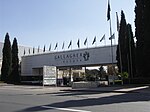Pan-African Parliament
| African Union flag | The Gallagher Convention Center (seat of the PAP) |
|---|---|

|

|
| Basic data | |
| Seat: |
|
| Legislative period : | 5 years |
| First session: | March 18, 2004 |
| Current legislative period | |
| Chair: |
(since 2015) |
| Website | |
| www.panafricanparliament.org | |
The Pan-African Parliament (English Pan-African Parliament, often short: PAP ) is a parliamentary body of the African Union (AU) with 255 members from all member states.
organization
The Pan-African Parliament was established in March 2004. Its establishment was provided for in Article 17 of the AU's founding act in 1991. It initially consisted of 202 members from 41 of the 53 member states of the AU. In 2008, it included representatives from 47 member states, each of whom sent 5 members to parliament. In 2018 there are members from all 55 member states of the AU. At a summit meeting in Addis Ababa in July 2004, the AU decided that the Pan-African Parliament should meet twice a year in the South African town of Midrand in the north of the metropolitan municipality of City of Johannesburg . However, it can also meet in other locations upon invitation, for example at the first session of the fifth parliament on October 22, 2018 in the Convention Center of Kigali in Rwanda .
The President of the Pan-African Parliament has been the Cameroonian Roger Nkodo Dang , who is also the representative for Central Africa , since 2015 . A vice-president was appointed for each additional African region: for North Africa Bouras Djamal from Algeria , for southern Africa the Zimbabwean Chief Fortune Chirumbira , for East Africa Stephen Julius Masele from Tanzania and for West Africa the Mali Haïdara Aichata Cissé .
Powers
The parliament has so far no legislative powers, but only has an advisory role. Legislative powers were to be added in 2010, but this has not yet happened. In 2014 a protocol was launched to expand Parliament's powers, the Malabo Protocol . It comes into force 30 days after a simple majority of the member states has ratified the protocol. To achieve this goal, 28 states are necessary, but so far only nine have ratified the protocol.
Objectives
Parliament has the task of implementing the policies and goals of the AU. It is intended to promote human rights and democracy in Africa , create conditions for peace, security, stability, cooperation and development, promote independence and economic recovery as well as public spirit among the African peoples and ensure that the member states comply with the requirements for good governance . It is also intended to inform the African population about these objectives and to work together with the regional economic communities.
Legislative periods
So far there have been five legislative periods. The first was from 2004 to 2009, the second from 2009 to 2012, the third from 2012 to 2015, the fourth from 2015 to 2018 and the fifth started in 2018.
Committees
In Addis Ababa in 2004, the establishment of ten permanent committees of the Pan-African Parliament, which should deal with various areas of life in Africa, was also decided:
- Committee on Agriculture, Agriculture, Natural Resources and the Environment
- Monetary and Financial Affairs Committee
- Committee on Trade, Customs and Immigration Matters
- Committee on Cooperation, International Relations and Conflict Management
- Committee on Transport, Industry, Communications, Energy, Science and Technology
- Committee on Health, Labor and Social Affairs
- Committee on Education, Culture, Tourism and Human Resources
- Committee on Gender, Family, Youth and People with Disabilities
- Committee on Justice and Human Rights
- Rules, Privileges and Discipline Committee
See also
- List of Members of the Pan-African Parliament (2004–2009)
- List of Members of the Pan-African Parliament (2009–2012)
Individual evidence
- ↑ Parliamentary organs of international organizations are not real parliaments, cf. Democratic legitimation of the activities of international organizations (PDF; 899 kB), p. 22 f.
- ↑ a b 19 new members inducted. Pan-African Parliament on Facebook, October 21, 2018, accessed October 24, 2018 .
- ↑ http://www.pan-africanparliament.org/FAQ_DisplayFAQ.aspx ( page no longer available , search in web archives ) Info: The link was automatically marked as defective. Please check the link according to the instructions and then remove this notice.
- ^ First Ordinary Session of the Fifth Parliament kicks off with renewed call for stronger African integration. (No longer available online.) Pan-African Parliament, October 23, 2018, archived from the original on October 24, 2018 ; accessed on October 24, 2018 (English). Info: The archive link was inserted automatically and has not yet been checked. Please check the original and archive link according to the instructions and then remove this notice.
- ↑ Hon. Chief Chirumbira of Zimbabwe accedes to the PAP Bureau. Pan-African Parliament on Facebook, October 24, 2018, accessed October 24, 2018 .
- ↑ Wilhelm, Iris; Wittek, Ralf, Das Pan - African Parliament (PDF; 187 kB) from October 20, 2010, last accessed on May 15, 2013
- ^ Protocol to the Constitutive Act of the African Union relating to the Pan-African Parliament (Malabo Protocol). (PDF) African Union, July 27, 2014, accessed October 24, 2018 .
- ↑ Four more countries heed the call for Africa's integration. (No longer available online.) Pan-African Parliament, October 10, 2018, archived from the original on October 24, 2018 ; accessed on October 24, 2018 (English). Info: The archive link was inserted automatically and has not yet been checked. Please check the original and archive link according to the instructions and then remove this notice.
- ^ Pan-African Parliament. African Union homepage, accessed October 24, 2018 .
Web links
- Official website of the Pan-African Parliament
